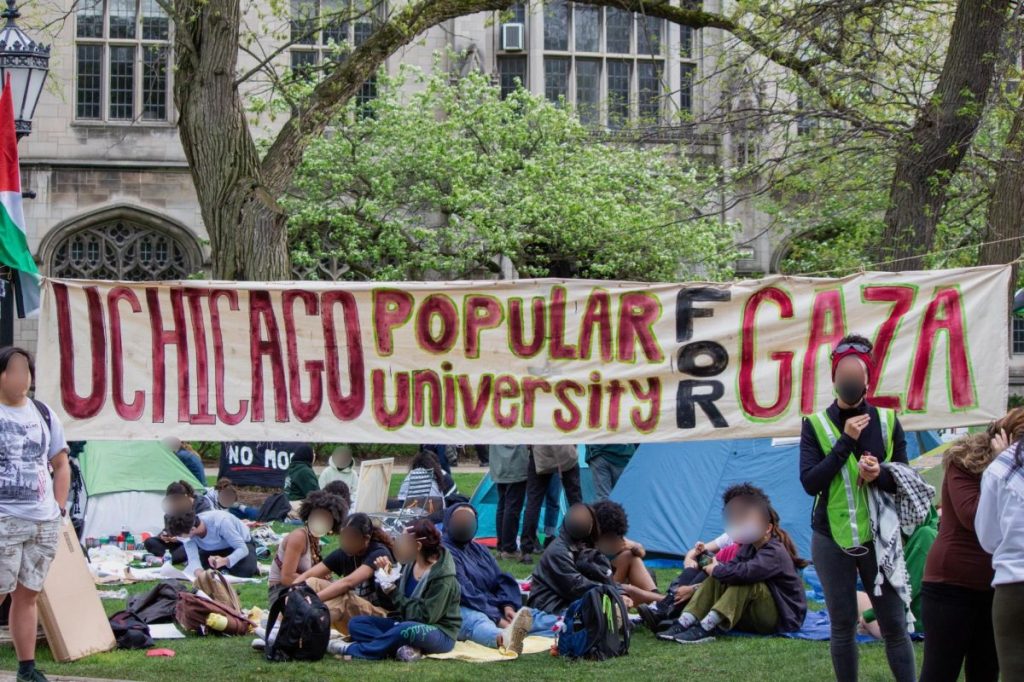Over the past month, students on college campuses around the country have launched encampments to protest Israel’s ongoing destruction of Gaza. On 29 April, a student-led encampment organized by UChicago United for Palestine (UCUP) went up on the quad outside Levi Hall, the University of Chicago’s central-administration building. Following failed negotiations over demands for divestment, disclosure, and repair, the University of Chicago Police Department (UCPD) raided and cleared the encampment shortly after 4:30 a.m. on 7 May.
During the eight days the encampment was present on campus, it was a site of education, protest, debate, and community, what organizers called the Popular University for Gaza. University and community residents mingled, talked, and ate together; faculty and students held both teach-ins and regular classes amidst the tents; singers performed; kids played and made art; speeches, rallies, and religious services (both Jewish and Muslim) were held.
The encampment resonated far beyond the UChicago campus. Student reporters at the Chicago Maroon provided live updates and in-depth coverage. And in the national media—in the NYTimes, the WSJ, and elsewhere—the encampment became for many an especially contested site for different takes on the state of the academy, not least because of UChicago’s self-promoted “Chicago Principles.”[1] Indeed, over those eight days, the administration issued several statements (to the campus community and then, on 7 May in the WSJ) that framed its response to the encampment, and eventually its decision to clear it, in terms of UChicago’s “core animating value” of free expression and its “foundational value” of institutional neutrality.[2]

The editors of Critical Inquiry deplore the use of police to clear nonviolent student protesters. We reject the administration’s stated reasons for doing so, whether in the name of campus safety or on the principle of institutional neutrality. With many of our colleagues (quoting from a 13 May open letter to President Alivisatos), we believe that “in choosing this course of action, the administration has elected to abandon its own principles of neutrality and the protection of free speech.” We also believe that the demands the students raised are vital, both to the current situation in Gaza and to broader principles and practices of a democratic university.
We have invited faculty and students from different backgrounds and levels of involvement to reflect on the encampment and its aftermath. By publishing a small cluster of posts, we hope to convey something of the particular tenor of the encampment at Chicago, as well as the particular controversies it provoked (and continues to provoke). Even as the Popular University for Gaza has been dispersed, it is important to record the complexities (affective, social, political) of this experiment in collective action and to insist on its ongoing relevance within and beyond the university.
[1] What’s become known as the “Chicago Principles” are articulated in a 2014 report of the Committee on Freedom of Expression at the University of Chicago.
[2] President Paul Alivisatos refers to free expression as “the core animating value of the University of Chicago” in “Concerning the Encampment,” his message to the campus community on Monday, 29 April. He calls institutional neutrality the “foundational value” of UChicago in his WSJ op-ed, “Why I Ended the University of Chicago Protest Encampment,” on 7 May 2024.
Eman Abdelhadi’s “Recognition Is Solidarity“
Itamar Francez’s “Freedom of Association“
Jessica H. Darrow’s “First, We Faced White Nationalists; UCPD Was Worse“
Christopher Iacovett’s “Institutional Neutrality in a Time of Genocide“
Hoda El Shakry’s “Palestine and the Politics of Imagination“
Kim Kolor’s “The Chicago Tactics”
Adam Almqvist’s “I Taught Israel/Palestine This Quarter – Right Now, There Is No Free Speech”


thank you for this expression of solidarity and community. i went to the encampment daily. it was an oasis of sanity i dearly miss. i’m terrified at what is happening in gaza and in the u.s. i now see clearly how deeply and dangerously zionism and american nationalism are entwined.